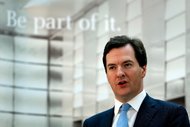LONDON — Depending on where one stands in the debate on the rising cost of housing in Britain, Paul Thomas and Abigail Walker, first-time home buyers, are either part of the solution or part of the problem.
To buy a £248,000, or $386,000, two-bedroom house in Oxfordshire, west of London, Mr. Thomas, a 38-year-old electrician, and his 25-year-old partner, Ms. Walker, who works in an accounting office, are making use of a government program called Help to Buy. Through it, they are able to make a down payment of only 5 percent from their own funds, with the government giving them an interest-free loan to cover the other 20 percent of the deposit.
The government of Prime Minister David Cameron has cast the program as a way to stimulate the country’s sluggish economy by helping consumers — skeptics might refer to them as voters — buy homes they could not otherwise afford. But critics say it could lead to a housing bubble and a spate of problem loans on which the government could be left to make good.
Under Help to Buy, rolled out in March, the government either offers interest-free credit or guarantees part of the property loan. The resulting higher demand for homes is supposed to fuel construction and aid the economic recovery.
“Help to Buy is a dramatic intervention to get our housing market moving,” George Osborne, the chancellor of the Exchequer, told Parliament in presenting the plan. “That is a good use of this government’s fiscal credibility.”
But over the last month, the program has drawn a growing outcry from some lawmakers and economists, demanding an early end for Help to Buy. They note that the housing market has already been picking up and warn that the plan could create a housing bubble that would be likely to burst when the program expires in 2016, while driving price increases that will make homes even less affordable for many in the meantime.
As evidence, they cite a report this month by the government statistical office that indicated that house-price inflation had risen in June at annual rate of 3.1 percent, up from 2.9 percent in May, bringing prices to the highest level in five years.
Albert Edwards, an outspoken strategist at Société Générale in London, called the British plan “madness” and “truly moronic,” saying that “buyers need cheaper homes, not greater availability of debt to inflate house prices even further.”
Critics also question the wisdom of enabling people to get a mortgage with a down payment of as little as 5 percent of the home value at a time when lenders are under pressure from regulators to reduce the riskiness of loans.
It also means that Britain is increasing support to the housing sector just as the United States is seeking ways to reduce the government’s role and risk in the mortgage market. This month, President Barack Obama proposed winding down Fannie Mae and Freddie Mac, the two giant government-backed mortgage finance companies.
“We do not want what the U.S. has, which is a government-guaranteed mortgage market, and they are desperately trying to find a way out of that position,” Mervyn A. King told Sky News in an interview a month before he retired in July as the Bank of England governor.
The International Monetary Fund warned in May that Help to Buy would push up house prices if the government does not ensure that more houses are built. Fitch, the debt ratings agency, has raised similar concerns.
The plan as announced in March by Mr. Osborne came in two parts. The first piece, in place since April, is limited to the purchase of newly built homes. The government offers a five-year interest-free loan worth 20 percent of the home value to help pay the deposit. Mr. Thomas and Ms. Walker are getting help through that portion of the program.
The second and more controversial part of the plan, which is due to start in January, allows the buyers of any house to pay only 5 percent of the value of the home as a deposit. The government would then guarantee an additional 20 percent of the bank loan for any property worth as much as £600,000, effectively passing the risk from the lender to the government.
“Using the government’s balance sheet to back these higher loan-to-value mortgages will dramatically increase their availability,” Mr. Osborne said when he presented the plan to Parliament in March.
Mr. Thomas and Ms. Walker had recently moved in with Ms. Walker’s mother in Oxfordshire to save money for a deposit, which they said would have taken them 10 years to come up with on their own.

Article source: http://www.nytimes.com/2013/08/24/business/global/outcry-grows-against-british-housing-plan.html?partner=rss&emc=rss
